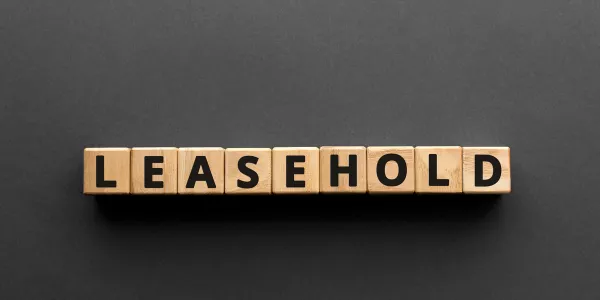Have you ever heard about fee simple? What about leasehold? How are these terms relevant to purchasing a home and why are they important? In this article, you will learn everything you need to know about these terms and other common questions related to this topic.
Backstory: How I started buying properties
Years ago, when I started looking to buy my first home, I was surprised by the number of terms used in the world of real estate! So many of them I did not know! I made an effort to teach myself everything I needed to know before making what was the biggest and wisest investment of my life: buying my first home!
Friends and family who were also buying homes began asking for my help and I realized that this information would be useful to more people, so I decided to create a comprehensive blog where homebuyers can find everything they need to know about buying a home.
Let’s cut to the chase: What Simple Fee and Leasehold actually mean
If you have never heard of fee simple or leasehold, this guide will cover everything you need to know about them: their meaning, main differences, pros and cons, and any relevant terms used when referring to them. I will also cover types of contracts used, and much more.
If you are already familiar with the topic, this post will refresh your memory and perhaps bring you some new insights. So, let’s dive in together and learn a little about the world of real estate.
To start, let’s keep it as simple as possible. Here is a chart summarizing the definitions and differences of each term:
| Fee simple/Fee Simple Absolute | Leasehold (land lease; ground lease) |
| gives full ownership of the property. | You're not the owner of the property. |
| Indefinite ownership time. | Has a fixed term on the contract. |
| Gives total control of the land and property, and is only limited by governmental regulations. | You can not change or build on the land without the owner's permission. |
| You can transfer the property (sell, rent, etc). | You can not transfer the property. |
Fee Simple/Freehold
Fee simple means the buyer has absolute ownership over the property. Fee simple ownership is the most common type of ownership for residential properties. The buyer can make changes to the property (build new structures, make renovations, etc.) and the property is indefinitely owned by the buyer.
Fee simple ownership is your traditional type of home purchase. You sign a contract to pay a certain amount per month (mortgage) and you can do what you want, within governmental regulations, with the property. It is as simple as that.
With fee simple, the owner must still pay a mortgage and property taxes, but he or she is still the outright owner of the property, meaning that the property can be changed or even sold, too.
Leasehold
A leasehold basically gives the lessee fewer rights, in terms of what they can do on the property, than fee simple ownership. Leaseholds are less common in the U.S. than fee simple set ups. Leaseholds are more common overseas and in states like Hawaii and Florida, or when it comes to commercial real estate.

In the case of commercial real estate, it is c ommonly called a “ground lease”. That said, it is good to know what leasehold means, in the event that you are buying a home in one of the aforementioned states, or if you are buying a property for commercial use.
In the scenario of a leasehold, the buyer is essentially paying a type of rent and he or she is not the outright owner of the property. This means that the lessee (the person leaseholding the property) does not have the right to make modifications to the property in any way without the permission of the fee simple owner.
If he or she does make modifications, it is possible that the fee simple owner, the person from whom the property is being leased, ask that modifications be undone upon the termination of the leasehold contract.
This brings us to another one of the main differences between fee simple ownership and leaseholding: the leaseholder will have to eventually return the property to the fee simple owner, in contrast to fee simple ownership, where the buyer owns the property absolutely and indefinitely. In this way, leaseholding is quite similar to renting.
Conclusion
If you are deciding between a leasehold and fee simple ownership, ask yourself if you want to own the property outright or not. If you want to own the property and have all the rights associated with completely owning a property, then the fee simple ownership set up is for you.
If you are not sure if you want to own the property outright, or if you see no need to make adjustments or changes to the property, then perhaps a leasehold is the better option.
Also, if the property is a commercial real estate property and you are a business person simply looking for a space to operate your business, it could be wiser to leasehold than to purchase. These decisions are very personal and are influenced by a number of factors, including future plans, financial circumstances and, ultimately, if you want to own the property or simply use the property in question.

For further information or guidance regarding this question of leaseholding or fee simple ownership, do what I did and speak with a specialist at Homeshift Team to help you make the best decision.
People Also Ask
What is the difference between leaseholding and renting?
The two terms can sometimes be used interchangeably. The main difference between renting and leaseholding, though, is the period of time that the property is occupied by the tenant. In rentals, the renter can have a monthly agreement or a year long agreement, whereas in leaseholding, the property user has a long-term contract of 25 to 99 years. Leasehold contracts can even be up to 999 years!
What is the difference between leasing and leaseholding?
Again, the main difference is the period of time the tenant occupies the property. In leasing, the period of time is shorter than that of leaseholding. Leases last between six months to a year, or can even be month-by-month. Leaseholding, however, usually lasts much longer (as stated above).
What are the advantages of a leasehold over a fee simple ownership?
Simply put, leaseholding gives the lessee less responsibility than fee simple ownership. A lessee does not own the property so any repairs needed would not necessarily be the responsibility of the lessee, but of the fee simple owner.
So, if you find a property that needs a lot of work, leaseholding might be the better option when it comes to negotiation. You might not want to deal with all of the costs associated with the labor required to render the property livable or useful, as you would with fee simple ownership.
Also, if the property is somewhat shared, like a townhouse or shared property scenario, then fee simple ownership might simply be more complicated, as you will not be able to make the changes you want to the property.
Finally, if you do not plan to keep the property indefinitely, or if you do not feel you will be able to resell the property for any reason, then leaseholding might be the better option.

 Marcio Vasconcelos
Marcio Vasconcelos





